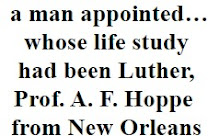Luther's Works.
The publication of the first two volumes, 1880 and 1881, which contain the so-called “great Genesis of Luther”, that is, Luther's detailed explanation of the first book of Moses, did not take too much work and effort. It was essentially a matter of comparing the old good German translation, which appeared soon after Luther's death, with the original Latin text and cleaning it of many errors and inaccuracies. The revision of the three following volumes, the House Postils and the two Church Postils, in which above all the various readings of the oldest prints had to be weighed against each other, was also easier to manage. Mr. Ehr. Körner, who was employed in our print shop at the time, did the preliminary work, which the undersigned then reviewed.
However, when the Reformation writings, the polemical and catechetical writings, and the other exegetical writings of Luther were approached, the necessity became apparent to find a suitable man for the editing who could devote all his time and energy to it. It seemed desirable, even necessary, to retranslate Luther's many Latin writings. The men who delivered the old translations on behalf of Walch moved very freely, often translated quite inaccurately, even incorrectly, and in many cases incorporated their own thoughts into Luther's thoughts. Also the text of the writings originally written in German needed careful examination, from line to line. The old typesetters of Luther's time were not accustomed to always stick strictly to the manuscript, and perusal of the typesetters' work by rarely the authors was not fashionable at that time either.
Furthermore, Walch's historical introductions to the individual writings of Luther proved to be quite inadequate. Since Walch's day, Luther literature has been so enriched, the newer Luther editions, such as the Erlangen and Weimar editions, and in general the works of the newer Luther researchers have added so much new historical material that it would have been a great shortcoming of our new Luther edition if this material had not been utilized. And so, in 1884, the board of directors of the Synodical Printing Office decided to hire a theologian whose exclusive task would be the revision of the Luther edition. After Candidate H. Bayer [Parts 3a, 3b] had edited the tenth volume, the catechetical writings, a man was appointed to this position whose life study had been Luther, namely Prof. A. F. Hoppe from New Orleans, and he has now taken care of the publication of all the volumes not yet mentioned, has sat behind his Luther day after day from morning till evening for just a quarter of a century with insignificant interruptions, and has undauntedly done the painstaking work of revision, in which one had to keep a close eye on every single word of the text.



No comments:
Post a Comment
Comments only accepted when directly related to the post.